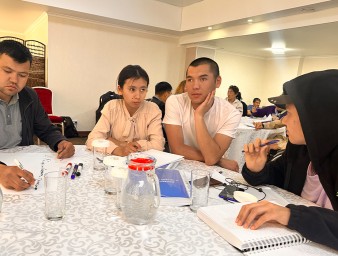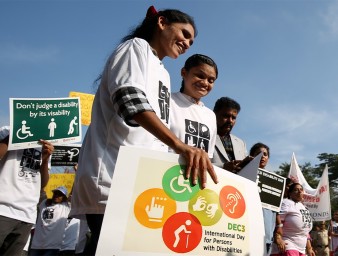A right to education for all, including persons with disabilities
14 February 2014

A new study by the UN Human Rights Office shows that school systems have adopted discriminatory approaches to persons with disabilities that can lead to denying them their right to education.
Some students are excluded from joining the educational system on the basis of an impairment, without any other education opportunity provided. Others are sent to schools designed to respond to a particular impairment, usually in a special-education system, and are thus segregated from the other students. Finally, some are integrated in mainstream schools so long as they can adjust to the schools’ standards.
According to the Convention on the Rights of Persons with Disabilities (CRPD), inclusive education is essential to realizing the right to education for all without discrimination and on the basis of equal opportunities, including for persons with disabilities.
The study explains that including students with disabilities entails eliminating barriers that restrict or ban their participation in the general school system; and changing cultures, policies and practices of the mainstream schools to accommodate the needs of all students, including those with impairments.
Inclusive education provides a platform for countering stigmatization and discrimination. It also enables persons with disabilities, who typically suffer from disproportionally higher rates of unemployment, to fully participate in society.
“A mixed learning environment that includes persons with disabilities allows their contributions to be valued, and prejudices and misconceptions to be progressively challenged and dismantled,” the study states. “Formal education facilitates formal certification, which is increasingly required by the open job market today.”
The study notes that education systems should forbid the denial of admission into mainstream schools on the basis of disability, promote the transfer of students with disabilities from special to mainstream schools, and guarantee non-discrimination by providing reasonable accommodation. This means that a school will have to make appropriate adjustments where needed to ensure that a student with disability access and participate in education on an equal basis with the other students.
Schools curricula, pedagogies and testing methods should be adapted to ensure that students with disabilities have access to an inclusive, quality and free primary and secondary education on an equal basis with others.
Measures should be put in place to eliminate attitudinal, physical, socio-economic, and communication barriers for students with disabilities who should also receive the adequate support, including individualized support, to facilitate their effective education. Further, their opportunity to acquire life and social development skills - such as learning of Braille and sign language - should be ensured.
The study also recommends the employment of teachers who are qualified in sign language and Braille, and the training of professionals who work at all levels of education in disability awareness and the use of appropriate communication and educational techniques.
After secondary education, persons with disabilities should have access to lifelong learning that appropriately responds to their continued educational needs.
The study further acknowledges that establishing inclusive education systems would require adopting immediate non-discrimination measures alongside the transformation of existing legislative and policy framework with the full involvement of persons with disabilities.
It also advocates for the adoption of an inclusive education goal in the new framework that will replace the Millennium Development Goals in 2015, to further contribute to ending exclusion of students with disabilities and ensure quality lifelong learning for all.
14 February 2014



